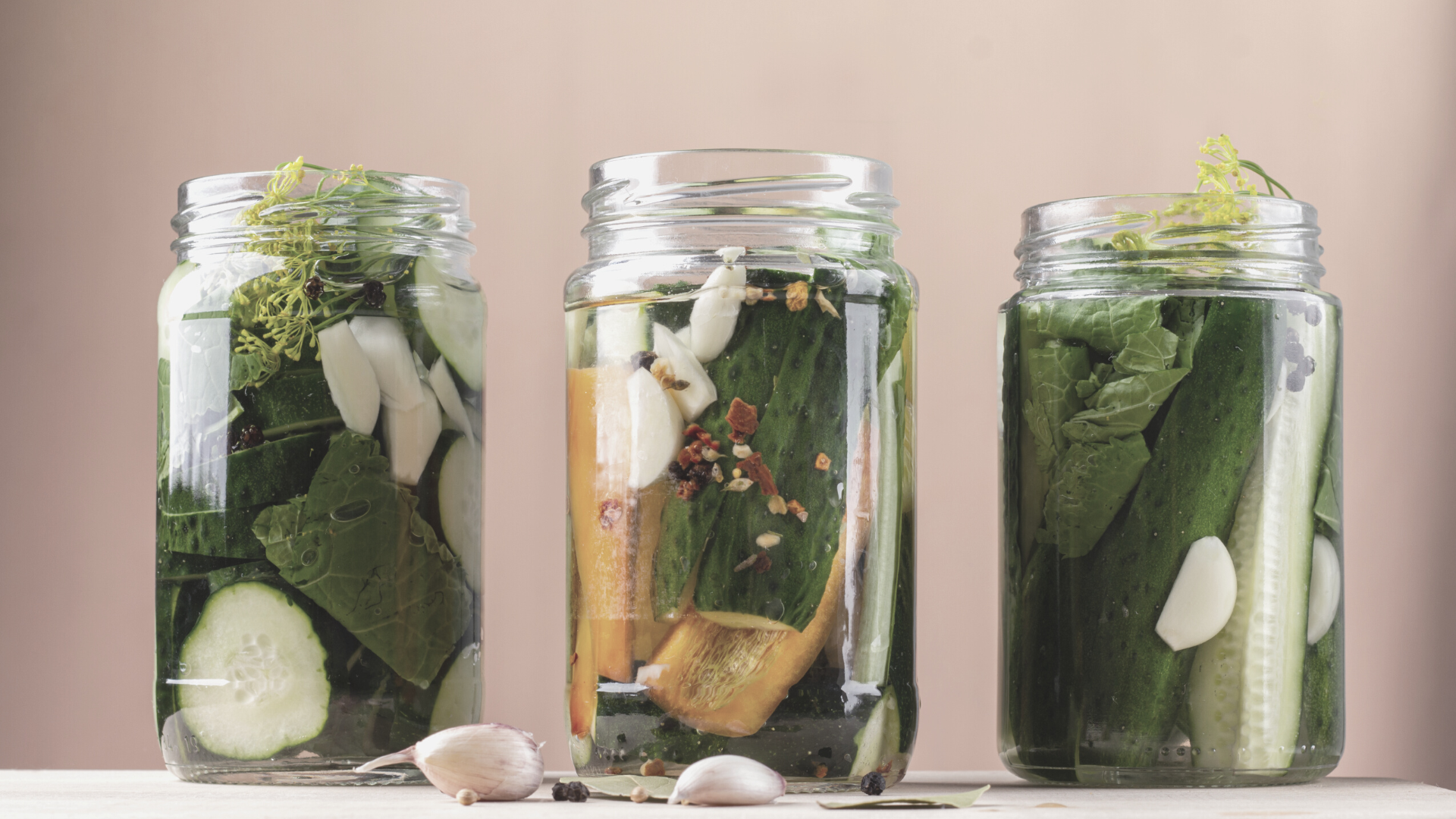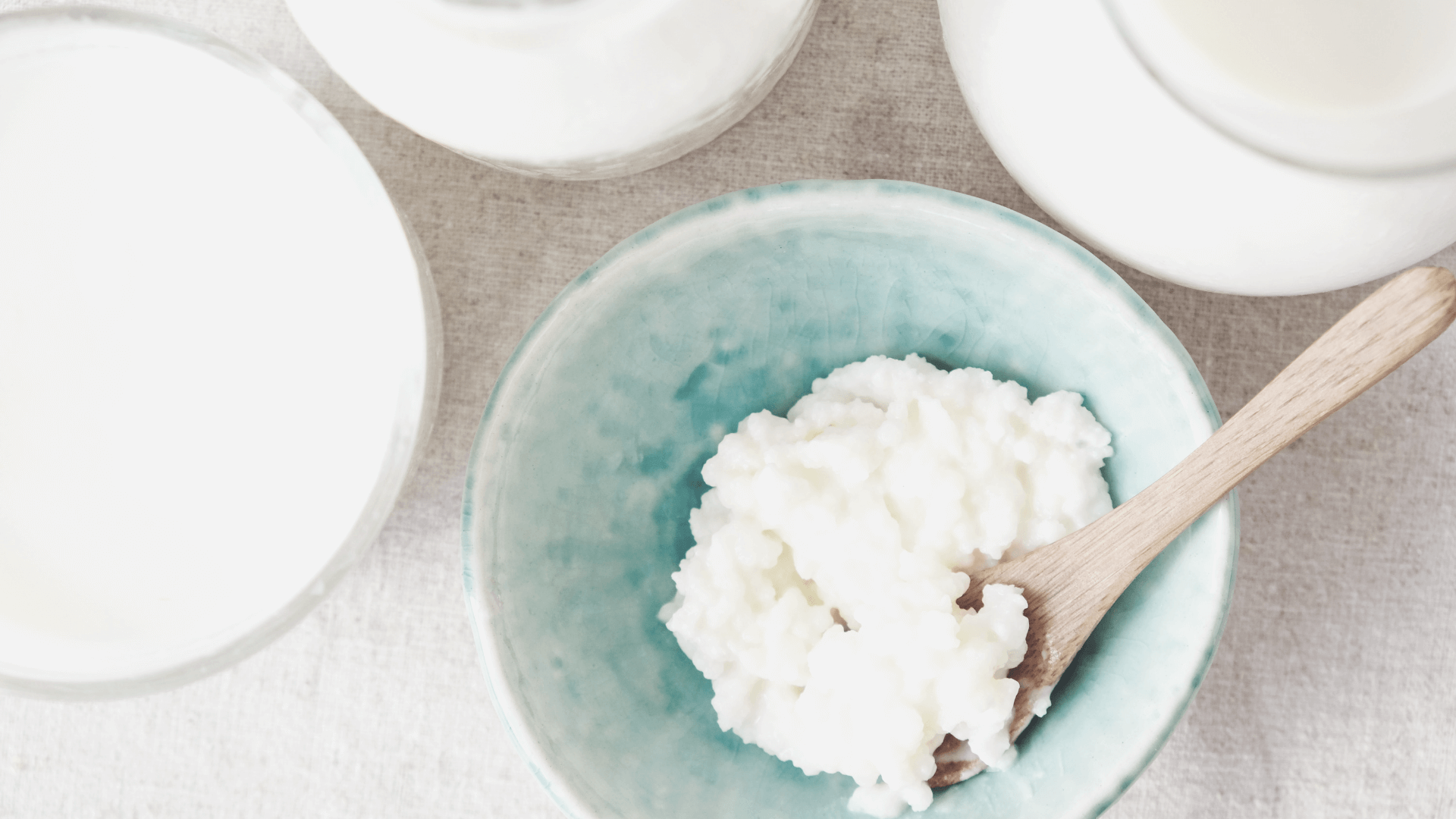Let’s chat bitter herbs for digestion, the science behind stomach acid, and take a deep dive into bitters.
Recently there has been a flurry of activity around the idea of low stomach acid and its impact on overall gut health.
Low stomach acid is cited as a root cause for SIBO and other unwanted critters such as yeast and parasites.
Its symptoms are very similar to those associated with irritable bowel syndrome. Yet, many people are finding relief simply by adding in naturopathic supplements.
Low stomach acid manifests in the way of gas and bloating, acid reflux, abdominal pain, undigested food in the stool, and either constipation or diarrhea.
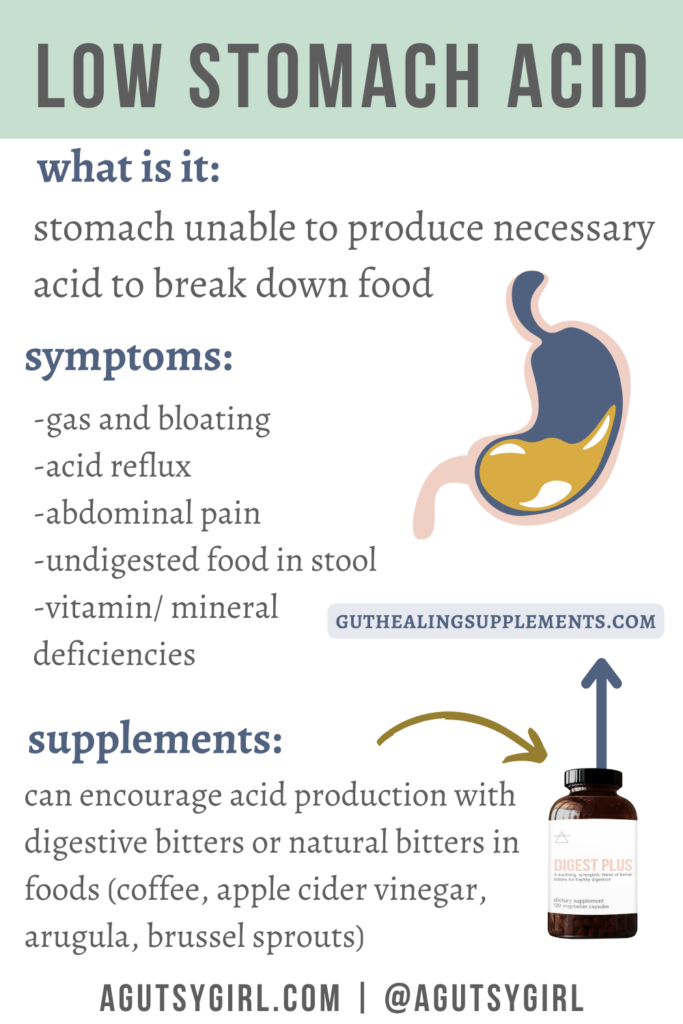
Without the proper stomach acid levels, it can also be hard to properly absorb nutrients, leading to vitamin and mineral deficiencies.
With such a long list of symptoms, there is no question as to why so many are turning to herbal medicine to try and naturally increase stomach acid.
Bitter Herbs for Digestion
Click HERE to save this post for later.
That’s where digestive bitters come in, a blend of herbs that help with overall digestive function and detoxification.
They have a long history of use and can be traced back to traditional Chinese medicine practice, where they took root as digestive aids.
Digestive bitters contain many different types of herbs, some of the main ones being:
- gentian root
- licorice root
- artichoke leaf
- dandelion root
- bitter root
- wormwood
- lemon balm
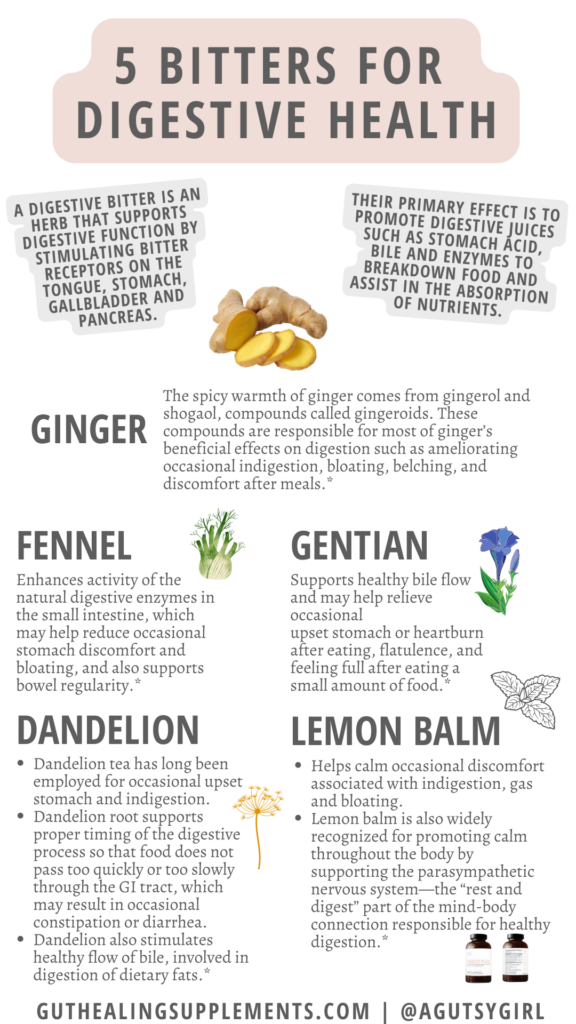
How do they work?
Digestive bitters work by activating the bitter taste buds on your tongue, also known as T2Rs.
These special receptors stimulate a response in our nervous system and spread a signal to our brain, encouraging it to wake up our digestive system.
Our brain sends a signal down a very specific cranial nerve known as the vagus nerve, which connects to our entire digestive system.
This nerve is often called the “gut-brain connection,” as it allows signals to communicate between the brain and the gut.
If you are someone struggling with your own digestion, this nerve will soon become your new best friend!
The signal travels down the vagus nerve into our digestive organs and stimulates the release of digestive enzymes from our pancreas and hydrochloric acid from our stomach.
These enzymes help break down fat, carbohydrates, and protein into small digestible pieces, while hydrochloric acid helps to unwind proteins.
The broken down food helps encourage better absorption of nutrients in the small intestine.
Learn more about digestive bitters + carminatives in this short, bite-sized A Gutsy Girl podcast episode.
It is crazy how such a small amount of herbs can trigger such a large-scale reaction in our body!
Without the proper breakdown of food, large pieces can end up making it to our colon, where they sit and ferment.
It is this fermentation that can increase the digestive discomfort so many of us are familiar with- gas, bloating, abdominal pain, and irregular bowel movements.
Lower stomach acid can also reduce the body’s ability to cleanse itself of unwanted invaders such as parasites or bacteria. This leads to even bigger issues down the road.
The good news is that by increasing our stomach acid with bitters we are both supporting the current and future health of our gut microbiome.
Benefits of digestive bitters:
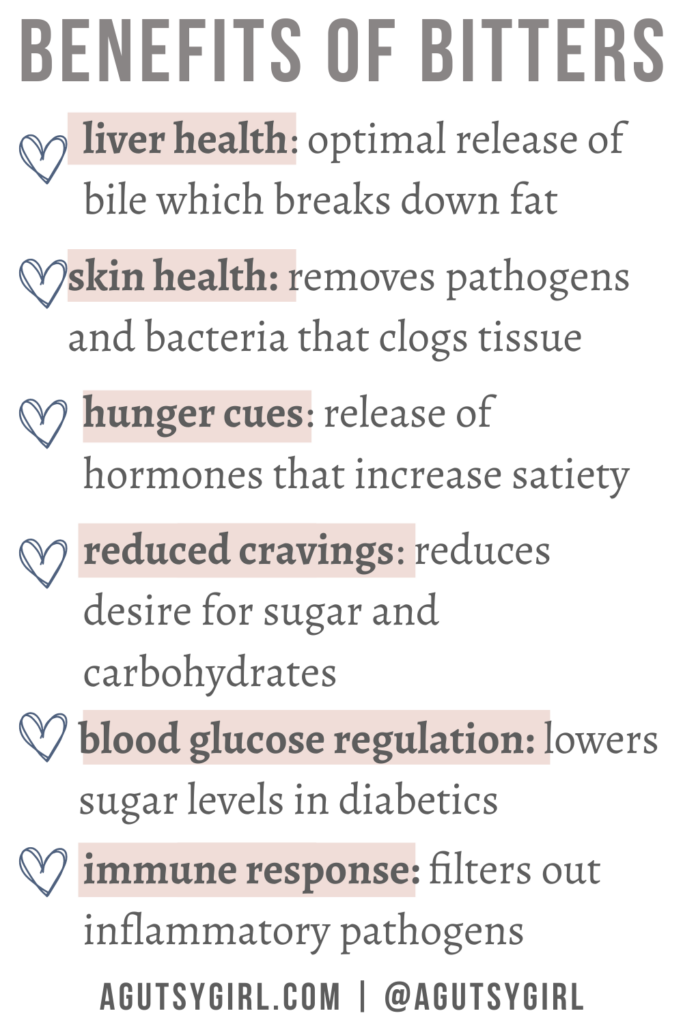
Bitters have so many benefits for our entire body, ranging from immune response to liver detoxification.
One of the most noticeable effects of bitters is found in our liver, where our body processes wastes, breaks down carbohydrates and produces bile, a liquid that helps our body to effectively break down fat.
Our liver is a key player in both our digestion and overall health so it comes as no surprise that boosting its function positively impacts our entire body.
In addition to digestion, the liver also plays a huge role in the microbiome of our overall skin health!
When our liver is operating at its optimal point it helps cleanse our bodies of toxic wastes such as bacteria and pathogens from the blood.
The removal of these potential irritants helps reduce the likelihood of acne or skin issues within our tissue, a complaint that is often tied to stomach issues.
Our sweat glands are similar to our livers in the way they process fat, so bitters can also help keep our skin tissue clean in this manner as well.
More Bitter Benefits
Bitters have also been shown to help with both blood sugar regulation and hunger cues.
When stimulated by our salivary glands, hormones in our gut are released to help increase feelings of satiation and fullness after a meal.
This can help realign your body with its natural hunger cues and prevent heavy carbohydrate and sugar cravings.
In addition, bitters have been shown to lower blood glucose in diabetics, as seen with bitter melon. More research is ongoing about the regulation of blood sugar levels as a whole, but it is looking positive.
T2R receptors are found throughout our body, so the impact of bitters is not merely limited to our digestive organs.
Bitters can also initiate our respiratory cells to initiate immune responses to bacteria we may breathe in.
This keeps foreign bacteria and pathogens from entering our body and boosts our overall immune system. Who wouldn’t want to give these herbs a try?
Other benefits include:
- decreased heartburn
- decreased acid reflux
- maintenance of healthy cholesterol levels
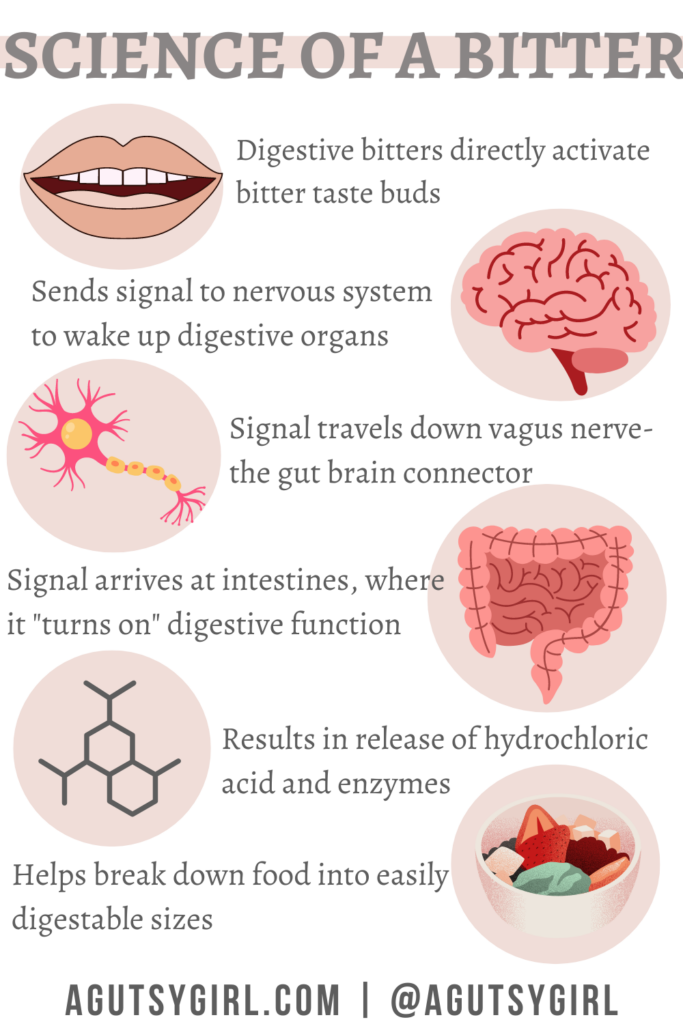
How to take bitter-tasting herbs:
Most bitter companies encourage you to take them 10-15 minutes before a meal to help your body prepare itself for the meal.
This helps to activate your digestion and give it a little bit of time to start producing enzymes and acid before you eat.
Some individuals have also found success waiting until after they eat to take their bitters.
As soon as the digestive distress starts, plopping a few drops on your tongue can help reduce gas and bloating.
Either method is helpful, so it really comes down to individual preference.
Personally, I find high protein and fat meals to be the hardest on my system, so I tend to keep a bottle of bitters nearby when I know I am about to eat something that may bother me.
Best digestive bitters:
Because A Gutsy Girl believes so strongly in the power of digestive bitters, her signature product in the brand new supplement line is based on bitter flavors in a formula created to and for the Gutsy community.
Digest Plus
Digest Plus includes centuries old herbal remedies that support digestion so that you can break down foods to properly absorb nutrients and feel your best after meals.
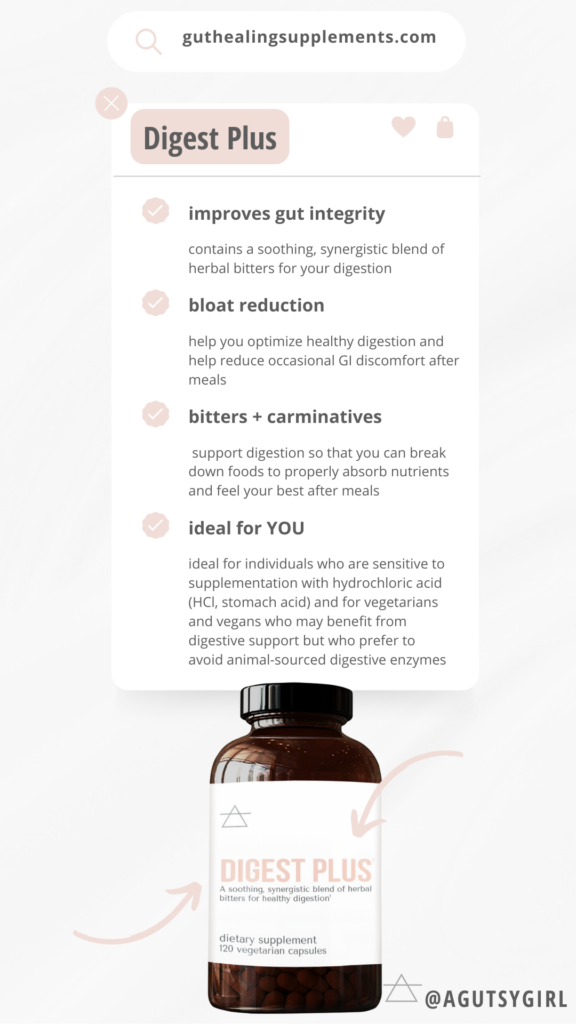
It is a powerful digestive support formula designed to optimize healthy digestion and help reduce occasional GI discomfort after meals.
If you constantly find yourself saying things like the following, then Digest Plus is for you:
I’m bloated
I’m not digesting food properly.
My stomach motility is off.
I need to optimize overall digestion.
Use code BLOG to save 15% off your Digest Plus order today.
Other Bitters
Here are a couple other options, if you desire them instead of Digest Plus.
- Urban Moonshine’s bitters. They are lightly sweetened with vanilla extract, which makes it easier on the taste buds! They also contain clear directions for taking, as well as a list of all the added benefits of each bitter type on their website. They provide a lot of information about the benefit of each ingredient and its effect on the body as a whole.
- Wise Women Herbals. They utilize simple ingredients that taste relatively good. When it comes to bitters often the more simple, the better!
Bitter alternatives:
If you want to test out how bitters affect you personally, it can be helpful to experience with natural bitters found in food first.
The flavors of these foods trigger a similar response in our body and can be particularly helpful with a high-protein meal.
Some examples of these foods are:
- arugula
- brussel sprouts
- dandelion greens
- apple cider vinegar (can be harsh on teeth so be careful!)
- coffee
All of these foods encourage acid production within our stomach and can increase enzyme production in the small intestine.
Adding a few leafy greens to your smoothie in the morning or to your chicken at night can give your system the added boost it needs to properly digest the nutrients.
Another trick is adding a bit of apple cider vinegar to meat before cooking, as it will break down the protein as soon as you start eating it.
By placing a greater emphasis on stomach acid production, we can help support both our gut and liver health.
Bitters are a great way to easily boost enzyme and gastric acid levels and can both prevent further gut complications or alleviate current symptoms.
Sources: HERE, HERE, HERE, HERE, HERE, HERE, and HERE.
If you liked this post, you might also enjoy:
- Liver Cells {Do you need a liver cleanse?}
- Gallbladder vs Heartburn {Episode 52 with Erin Holt}
- 11 Ways to Naturally Improve Stomach Acid Production
Xox,
SKH
Janie Greene is


